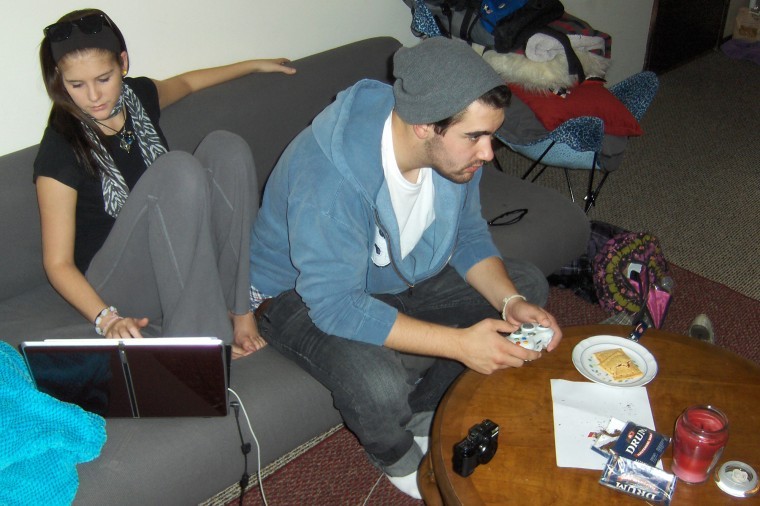Student Legal, landlords offer advice for aspiring student renters
Casey Lange, senior art history major, plays video games in his apartment on West Hillcrest Drive as Megan Millon, junior physical therapy major, browses on a laptop Wednesday afternoon.
October 7, 2010
Before signing the dotted line and committing to an apartment with loud neighbors, numerous damages and “crazy roommates,” it’s critical to know rights and discrepancies outlined in an apartment lease.
NIU offers free legal advice to students at the Students’ Legal Assistance Office in the Campus Life Building, Suite 120. Donald Henderson Jr., attorney and director of the Students’ Legal Assistance Department, , advises students to consider the following before signing an apartment lease.
Know potential roommates:
It’s important to realize when someone signs a lease with unrelated roommates, they are all held to “joint and several liability”. Joint and several liability implies that individuals are either individually or mutually responsible to pay rent. If a roommate decides to stop paying rent for a variety of reasons, the remaining roommates still have to pay the rent.
“The landlord is not restricted to going after the person who isn’t paying,” Henderson said. “The landlord can look to any or all of the remaining roommates to make up for the rent that wasn’t being paid. From the landlord’s perspective it’s irrelevant how many people are living there…they don’t care where that money is coming from.”
Moving in with strangers may not be the best option.
“Our advice is to know your roommates really well,” said Kathy Laing from Laing Management, 701 Lucinda Ave., #100.
Ask to see the apartment:
When considering leasing an apartment, a person can be shown the actual apartment they would be renting, another apartment or a model.
“If it’s a model apartment, it’s worthwhile to question the person who’s showing the apartment, to make sure that they’re promising that the actual apartment can be comparable in quality to the model,” Henderson said.
Ask for a copy of the lease and read it:
“I would suggest reading the lease; a lot of the issues tenets run into is because they didn’t read the lease,” said lease manager, Carl Volk, at Suburban Apartments & Estates, 1400 Twombly Road DeKalb.
Don’t be afraid to negotiate the terms:
When negotiating the terms of the lease, the tenant is not required to defer to the landlord.
“You are of equal standing with the landlord.” Henderson said. “Under the law, the landlord has no business dictating terms of the lease. Since you’re being held liable for what you do, you might as well take advantage of the fact that you’re on equal terms with your landlord.”
“In becoming a tenet, you’re entering into a binding, legal agreement with the landlord and that calls for an awareness of what the terms are and a recognition that on the one side as a tenet you’re bound by the terms of the lease, but at the same time, the tenet has the right and is assumed to have negotiated with the other side,” Henderson said.
Sometimes landlords or tenets can add addendums to the lease which add additional negotiations and specifications. “I just encourage them (potential tenets) to read the addendum to our lease and to ask us if they have any questions,” said manager Cindy Anderson, from Parkside Drive Apartments, 1329 Sycamore Road.
Thoroughly document conditions:
If conditions are not thoroughly recorded, they could prevent a tenet from getting their security deposit back or even have to pay additional fees. Henderson said that taking pictures of an apartment, before move-in and move-out, with a digital camera can also provide evidence for later.
“Some landlords will provide a room condition report upon move-in, some won’t,” Henderson said. “Whether a tenet uses the landlord’s form or their own form, or supplements the landlord’s form, the important point is to document, thoroughly, everything one sees at the point of move-in.”
Report other damages promptly:
Henderson said that tenets should notify the landlord promptly if there is a problem, even if it’s minor.
“The landlord has a duty to make repairs because a tenet has the right to expect that the apartment they are renting is inhabitable,” Henderson said.
Many apartments adhere to certain priorities before others.
“First priority would be things that are hazardous if they weren’t taken care of… the last things would be minor aesthetic things that need to be taken care of in the apartment,” Volk said.
Also, the landlord does not need to give notice if they are making repairs that the tenet requested. The landlord, however, can’t make repairs if they don’t know they are needed. It is critical to get written documentation of repair requests.
“Under the law, the landlord can’t be expected to make repairs, if they don’t know that the repairs are there to be made,” Henderson said. Even if the tenet doesn’t particularly care if certain repairs are made, damages can escalate. Then, the landlord can later presume that the tenets caused the problem and either refuse to give them back the security deposit or charge them additional fees.
Consider renter’s insurance:
“Usually it’s a cost that’s worthwhile in terms of the protection,” Henderson said. “It’s usually a very good idea to go ahead and get renters’ insurance,”
he said, however, sometimes individual students might still be covered under their parent’s home-owners policy.













